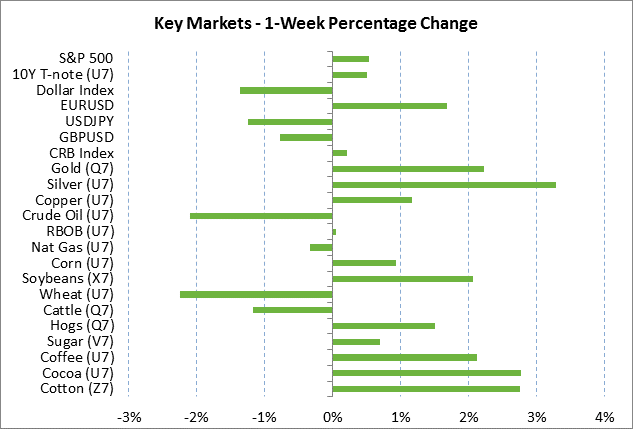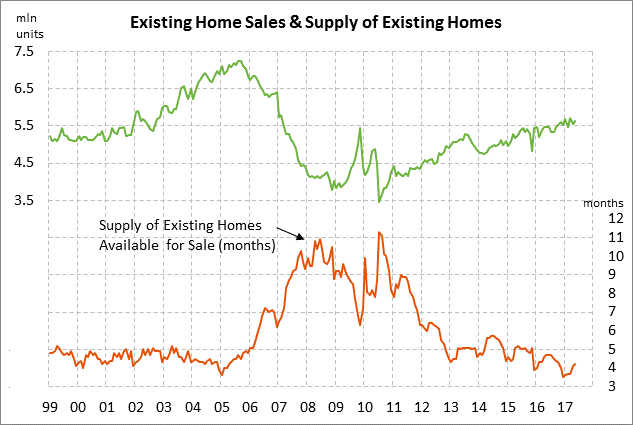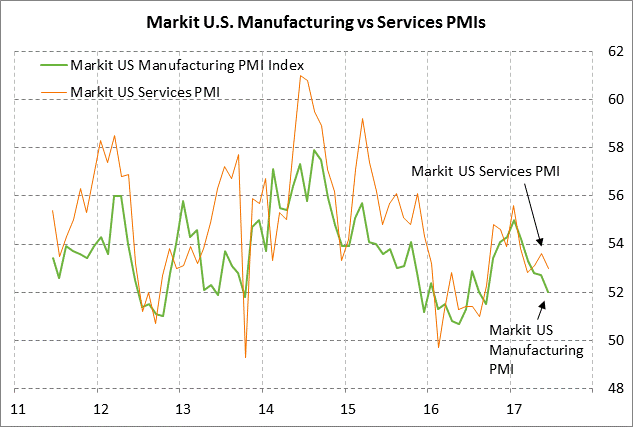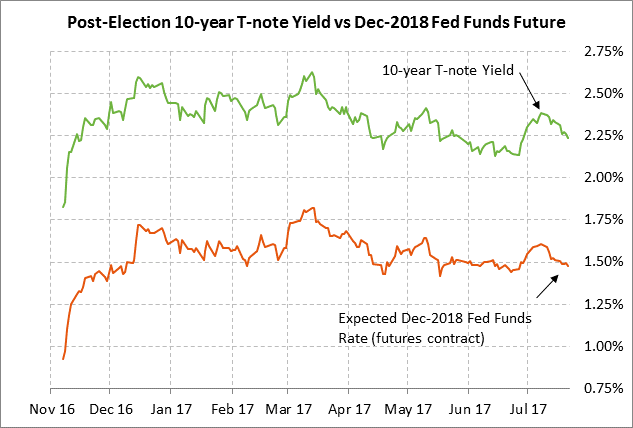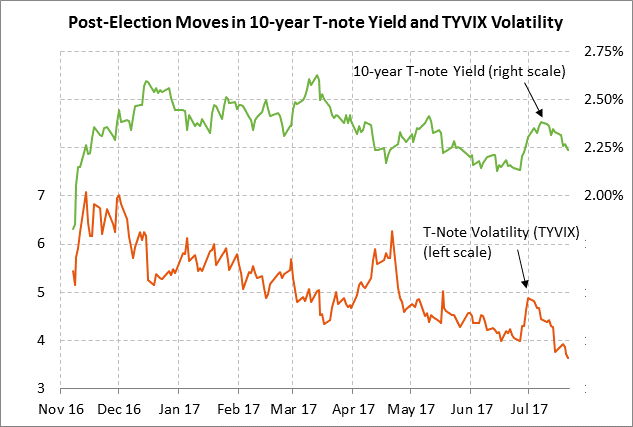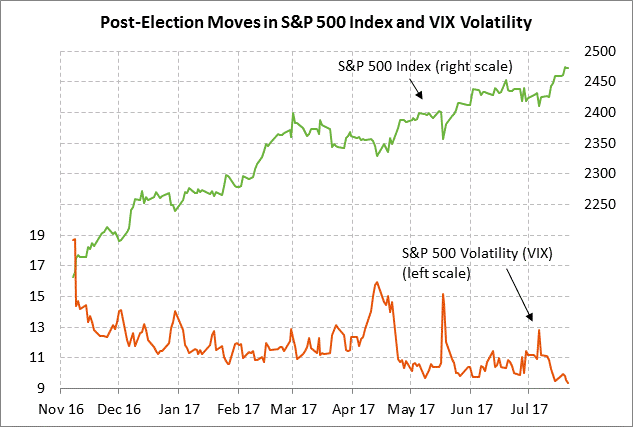- Weekly U.S. market focus
- Chaotic week ahead in Washington
- FOMC meeting could produce an announcement on the balance sheet program start date
- Peak week for Q2 earnings
- U.S. T-note and stock prices rise while volatility falls to new lows
Weekly U.S. market focus — The U.S. markets this week will focus on (1) the Tue/Wed FOMC meeting which could produce an announcement date for the beginning of the Fed’s balance sheet reduction program, (2) a chaotic week in Washington with the Russian investigation, Senate Republican’s last-ditch effort to pass a health care bill, and House Speaker Ryan’s need to get a 2018 budget resolution approved, (3) a busy U.S. economic calendar topped off by Friday’s Q2 GDP report (expected +2.5% after Q1’s +1.4%), (4) peak Q2 earnings week with 190 of the SPX companies scheduled to report, (5) the Treasury’s sale of $103 billion of T-notes, and (6) oil prices as OPEC and non-OPEC oil ministers meet in St. Petersburg on Monday to discuss their production cut agreement.
Chaotic week ahead in Washington — This will be a busy week in Washington as Senate Republicans launch a last-ditch effort to pass a health care bill and as the Russian investigation continues at full tilt with key Trump family members and advisors due to appear before Congressional committees. The House is due to leave late this week for its August recess, but House Speaker Ryan has said the House will stay in session if the Senate passes a health care bill and sends it over to the House for their approval. The Senate would normally leave town late this week for its August recess as well, but Senate Majority leader McConnell has said he plans to delay the Senate’s recess by two weeks to keep working on the health care bill.
Senate Majority leader McConnell’s first job this week is to get at least 51 Senators (or 50 Senators plus VP Pence) to approve a procedural motion to proceed to get the health bill on the floor where the bill can be amended. It remains to be seen whether Mr. McConnell has enough votes for the motion to proceed, let alone a health care bill itself.
Meanwhile, the House this week is scheduled to vote on a 2018 budget resolution, which is the legislative vehicle that contains the reconciliation measures that are necessary for passage of an eventual tax reform bill with a 51-vote majority in the Senate. House Freedom Caucus members are threatening to hold up the budget resolution, but the resolution is likely to pass since it is critical for the tax bill and since the resolution is non-binding in any case. The betting odds that Congress will approve a corporate tax rate cut by year-end fell this past weekend to 37% from 43% last week, according to PredictIt.org.
FOMC meeting could produce an announcement on the balance sheet program start date — The odds for a Fed rate hike this week are very low at 12%, according to the federal funds futures market. There will be no press conference by Fed Chair Yellen after this week’s meeting. However, there is perhaps a 40%-50% chance in our view that the FOMC at this week’s meeting may announce the start date for its balance sheet reduction program. The market consensus is that the FOMC will wait until its next meeting on Sep 19-20 to announce the start date. However, if the FOMC plans to start its balance sheet reduction program on Oct 1 so that it coincides with calendar quarters, then a Sep 19-20 announcement would give the markets only a 10-day heads up before the program starts. For that reason, the FOMC may decide to announce the start date this week to give the markets more time to prepare for the program.
The odds for the Fed’s next rate hike have fallen in recent weeks mainly because of soft inflation data. The markets are discounting the odds of the Fed’s next rate hike at only 20% by the Sep 19-20 FOMC meeting, 22% by the Oct 31/Nov 1 meeting, and 56% by the Dec 12-13 meeting.
Peak week for Q2 earnings — This will be the peak week for Q2 earnings with 190 of the S&P 500 companies scheduled to report. There will be 142 companies that report next week. Notable reports this week include Alphabet on Monday; AT&T, GM, and Caterpillar on Tuesday; Facebook, PayPal, Ford, and Coca-Cola on Wednesday; Amazon, Mastercard, Intel, Starbucks, and UPS on Thursday; and Exxon Mobil and American Airlines on Friday.
Earnings results last week were favorable and pushed SPX Q2 earnings expectations up to +9.6% y/y from 8.1% the previous week, according to Thomson Reuters I/B/E/S. Excluding the upward rebound in energy earnings, SPX earnings expectations improved last week to +6.9% from +5.2%. Q2 earnings reports have been positive thus far with 74.2% of reporting companies beating expectations, well above the long-term average of 64% and the 4-quarter average of 71%, according to Thomson Reuters I/B/E/S.
Looking ahead, the market consensus is for SPX earnings growth of +7.7% in Q3, +12.5% in Q4, +10.0% in Q1-2018, and +11.9% in Q2-2018. On a calendar year basis, the consensus is for SPX earnings growth of +11.3% in 2017 and +11.2% in 2018.
U.S. T-note and stock prices rise while volatility falls to new lows — U.S. stock and T-note prices rose last week on reduced expectations for Fed rate hikes. The Dec federal funds futures contract has fallen by -6 bp in the last two weeks to 1.265%, reflecting reduced expectations for Fed rate hikes in 2017/2018. The 10-year T-note yield in the past two weeks has fallen by -15.7 bp to 2.238% from the early-July 2-1/2 month high of 2.395% due to (1) easier Fed expectations, (2) soft inflation expectations, and (3) reduced concerns about bund yields. Meanwhile, the S&P 500 last Thursday rallied to a new record high and closed the week up +0.54% due to (1) lower T-note yields, (2) reduced Fed rate-hike concerns, (3) strong earnings, and (4) revived technology stocks. The VIX index last Friday fell to a record closing low of 9.36% and the TYVIX fell to a 4-year low of 3.64%.

